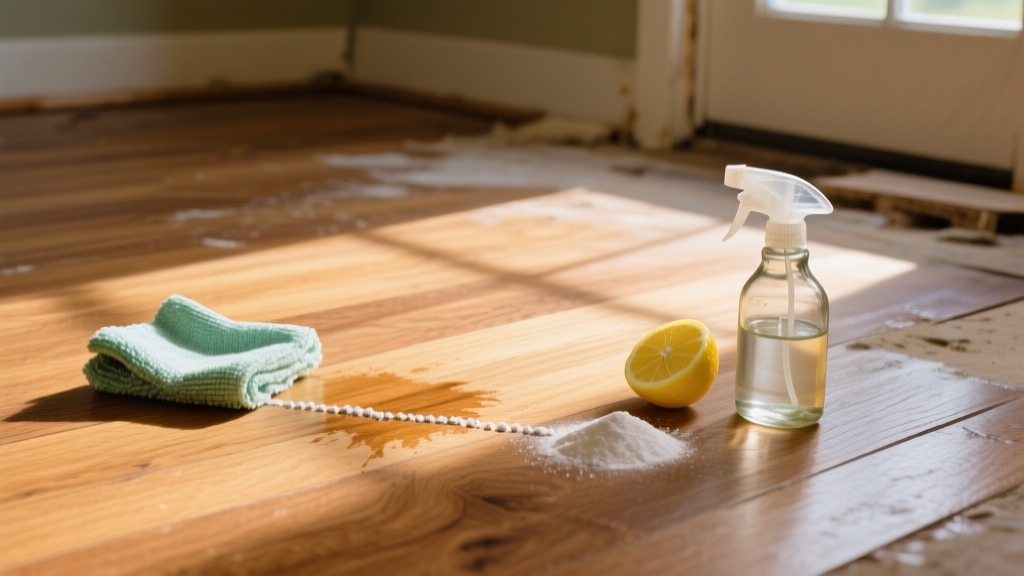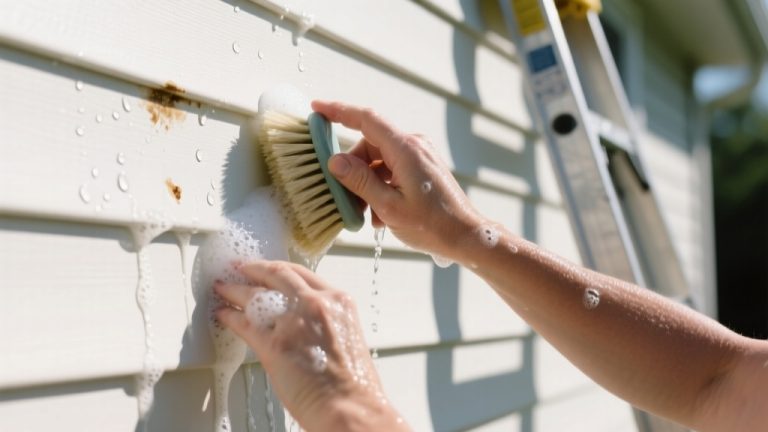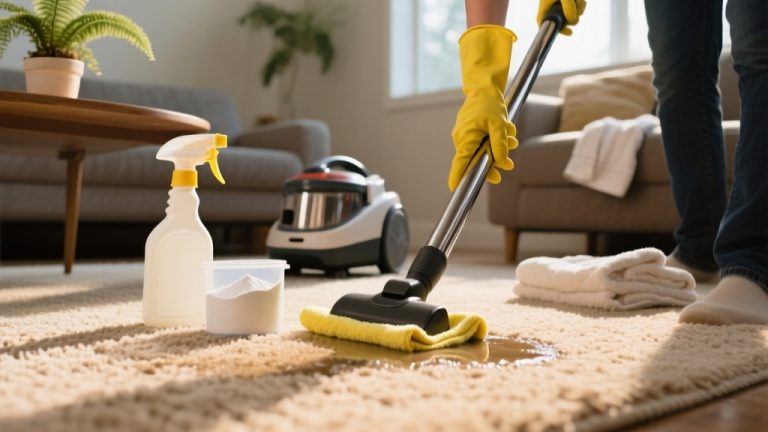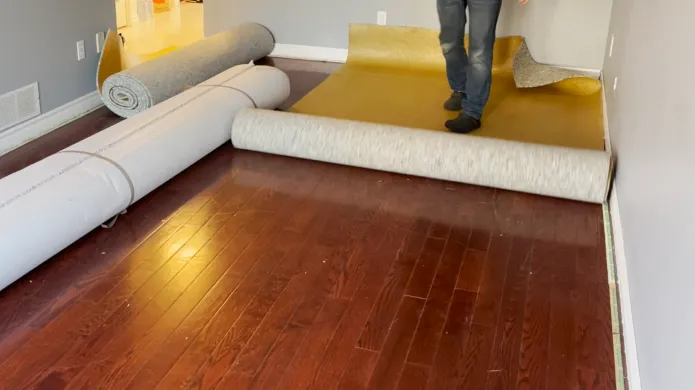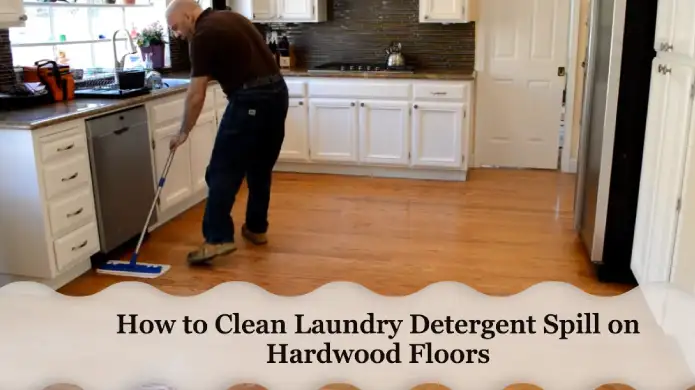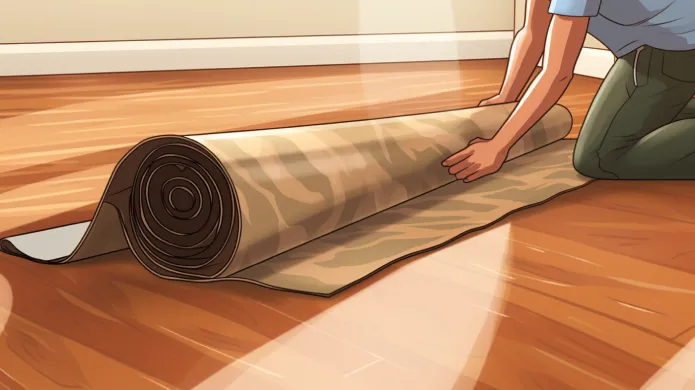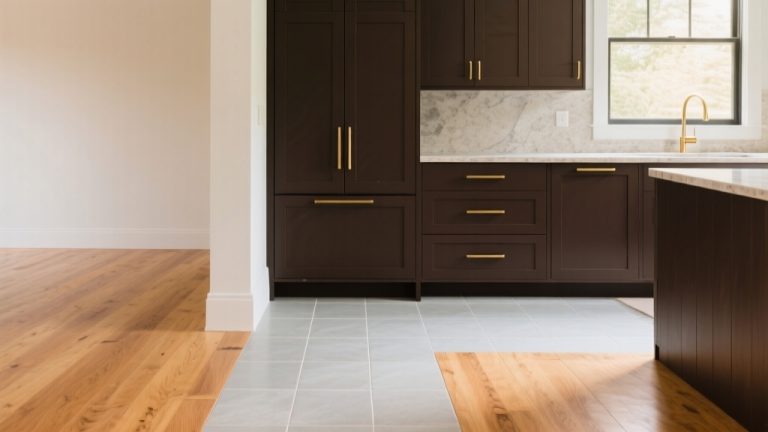How to Get Smell Out of Hardwood Floors: Odor Neutralizers
To get smells out of hardwood floors, start by pinpointing the source, like spills or pet accidents. Clean the area with a mild hardwood cleaner and blot urine spots without rubbing. Use baking soda or a vinegar-water mix to neutralize odors, then air out the room.
For persistent smells, try enzymatic cleaners or deep cleaning methods. Proper ventilation and regular maintenance will prevent future odors. You can explore more advanced solutions and tips to fully refresh your floors.
Key Takeaways
- Identify the odor source by inspecting stains, moisture, or pet accidents and use moisture meters to detect hidden dampness under the wood.
- Clean the floor immediately by sweeping, blotting spills, using mild hardwood cleaner, and applying baking soda to neutralize odors overnight.
- Use natural deodorizing methods like vinegar-water mops, baking soda paste, activated charcoal, and ensure proper ventilation for fresh air circulation.
- Apply enzymatic or commercial odor neutralizers designed for hardwood floors, following product instructions carefully to eliminate persistent smells.
- Maintain humidity control, clean spills promptly, and consider professional deep cleaning or refinishing to prevent and remove stubborn odors permanently.
Identifying the Source of Odor on Hardwood Floors
How can you pinpoint the source of an unpleasant odor on your hardwood floors? Start by sniffing around to detect localized smells, especially near pet areas or stains. Check for musty, damp odors signaling mold or mildew, often linked to moisture beneath or on the wood.
Inspect the floor visually for stains, discoloration, warping, or soft spots indicating water damage. Consider environmental factors like high humidity, leaks, or poor ventilation that encourage odor formation. Use moisture meters to identify damp areas hidden under the surface.
Remember, old or damaged floor finishes can trap odors and allow them to seep through. Also, odors might stem from trapped debris in floor cracks or residues from cleaning products.
Accurate identification is vital before you move on to effective odor removal techniques. During renovation or cleaning, be aware that excess moisture can harm hardwood floors and contribute to odors and damage.
Immediate Steps to Tackle Pet Urine Smells
Whenever pet urine hits your hardwood floors, act quickly to minimize damage and odor. First, blot fresh urine with a clean cloth or paper towels—avoid rubbing to prevent spreading.
Apply baking soda immediately to absorb moisture and neutralize odor; leave it overnight for best results. Use gentle hardwood-safe cleaners, steering clear of harsh chemicals that can harm the finish.
You may carefully apply a diluted vinegar solution to break down urine acids, but always test on a small area first. It is important to avoid excessive moisture during cleaning to prevent warping or buckling of the wood.
Prompt cleanup reduces the risk of urine penetrating deep into the wood, which causes staining, warping, and persistent odors. This is important because urine is acidic, which can break down the finish of hardwood floors.
Quick action limits damage to the finish and prevents ammonia-based dark stains, ensuring easier odor removal and preserving your hardwood’s integrity.
Natural Remedies for Deodorizing Hardwood Floors
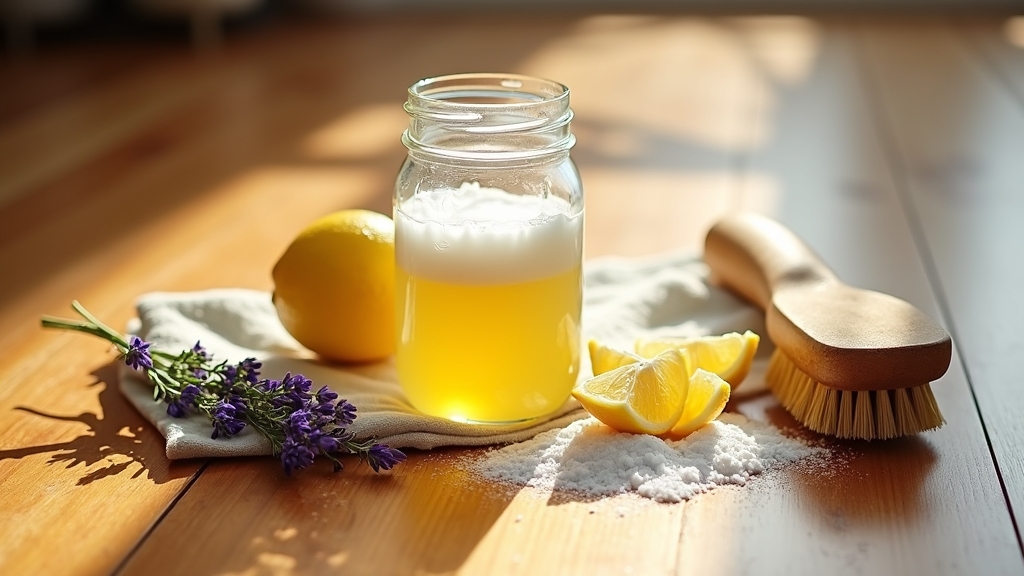
After addressing pet urine promptly, you’ll want to explore natural remedies that effectively deodorize hardwood floors without risking damage. Baking soda works well by neutralizing odors; apply a baking soda-water paste to affected areas, let it sit 30 minutes to overnight, then vacuum thoroughly. Using a microfiber mop and pH-neutral cleaner afterward helps preserve the floor’s finish and prevents damage from excess moisture.
White vinegar diluted with equal parts water disinfects and neutralizes odors—mop floors with this solution and add a few drops of essential oils like lavender or lemon to mask vinegar’s scent. This vinegar and water mixture is considered one of the best homemade cleaners for wood floors. Activated charcoal placed nearby absorbs lingering smells passively without touching the wood.
For enhanced cleaning, combine vinegar with mild soap or baking soda for a fizzing reaction that lifts grime and odors. Always dry floors thoroughly and make certain good ventilation to protect your hardwood from moisture damage. Regular use of pH-neutral cleaning agents ensures the floor’s longevity while maintaining its natural beauty.
Effective Use of Commercial Odor Neutralizers
While natural remedies offer gentle odor control, commercial odor neutralizers provide powerful, targeted solutions for persistent smells on hardwood floors.
You can choose enzymatic cleaners to break down organic odors like pet urine or chemical neutralizers such as Odorcide 210, which permanently eliminate malodors without masking. Odorcide 210 works through bonding and absorption, avoiding the use of enzymes or bacteria, which can be more effective for certain odors.
Activated charcoal traps odor molecules physically, while ozone generators oxidize them, though you must use ozone carefully due to health risks. For best results, ensure floors are free of loose dirt by vacuuming hardwood floors before applying any odor neutralizer. Apply these products directly to clean floors, allowing sufficient dwell time—enzymes often need 10-30 minutes.
Always dilute concentrated formulas per instructions, ensure good ventilation during use, and pick non-toxic, non-flammable options safe for hardwood finishes. Following these guidelines guarantees effective odor neutralization without damaging your floors or compromising indoor air quality.
Deep Cleaning and Restoration Techniques
If you want to eliminate stubborn odors from hardwood floors, deep cleaning and restoration techniques are essential. Start by using enzymatic cleaners that break down organic odor molecules, especially pet-related smells.
Follow with a mild vinegar and water solution to neutralize lingering odors without harming the finish, and make sure the floor dries completely to avoid moisture damage. Proper ventilation, such as cross-ventilation and using fans, can significantly help speed up the drying process and reduce odors.
Using a pH-neutral cleaner can further protect your floor’s finish while effectively removing odor-causing residues. For severe cases, consider sanding and refinishing to remove deeply embedded odors.
Key steps to tackle odors effectively include:
- Thoroughly removing dirt and residues from surface and crevices to prevent odor buildup.
- Applying sealants that lock in odors while maintaining wood breathability.
- Using commercial dehumidifiers and air purifiers to control moisture and improve indoor air quality.
Tips for Preventing Odors on Hardwood Floors
To keep your hardwood floors smelling fresh, focus on prevention through consistent care and smart maintenance. Start by applying a high-quality sealant to block odors and moisture, resealing regularly to extend lifespan and prevent mold.
Sweep and dust frequently, mop with pH-balanced wood cleaners, and avoid excess water to stop mold growth. Controlling moisture is crucial because moisture leads to mold, which causes damp, earthy scents. Regularly vacuuming with attachments designed for hardwood also helps remove debris that can trap odors.
Place rugs in high-traffic or pet areas and clean spills promptly. Blot and don’t rub to avoid deep odor absorption. Use enzymatic cleaners on pet stains immediately.
Enhance airflow with fans and air purifiers to reduce mustiness. By combining these proactive steps, you’ll effectively keep odors from settling into your hardwood floors, maintaining a clean, fresh-smelling home environment.
Frequently Asked Questions
Can Hardwood Floor Smells Affect Indoor Air Quality?
Yes, hardwood floor smells can affect indoor air quality, especially if they stem from VOC off-gassing, mold, or trapped moisture. You might notice odors from adhesives, finishes, or mildew, which release compounds that irritate your respiratory system.
To protect your health, you should guarantee proper ventilation, control humidity, and clean floors regularly. Addressing these smells promptly helps maintain fresher, healthier indoor air and reduces allergy or asthma triggers.
Are Essential Oils Safe to Use on Hardwood Floors?
Yes, you can safely use essential oils on hardwood floors if you dilute them properly. Undiluted oils can damage the wood finish, but when mixed with water, vinegar, or mild soap, they clean without causing corrosion or residue buildup.
Just avoid over-saturating the floor and always spot test first. Essential oils not only clean effectively but also leave a fresh scent, preserving your floor’s beauty while enhancing your home’s air quality.
How Often Should Hardwood Floors Be Professionally Cleaned?
You should have your hardwood floors professionally cleaned about once a year to maintain their finish and remove buildup like oils and dirt. If you have pets or heavy foot traffic, consider scheduling cleanings every 6 months.
Regular dusting and spot cleaning help, but professional deep cleaning with certified products is essential to protect your floors and extend their life. Consult a flooring expert for a tailored cleaning schedule.
Can Hardwood Floor Odors Cause Health Problems?
Like a hidden fog, hardwood floor odors can quietly affect your health. Yes, these smells often come from VOCs or mold-related compounds that may cause headaches, respiratory irritation, or allergies.
Prolonged exposure can lead to more serious issues like asthma or neurotoxic effects. You should address these odors promptly by improving ventilation and choosing low-emission finishes to protect your indoor air quality and well-being.
Is It Safe to Use Steam Cleaners on Hardwood Floors?
You can safely use steam cleaners on hardwood floors only if they’re properly sealed. Unsealed wood absorbs moisture, risking warping or damage.
Always use a steam cleaner with controlled dry steam and keep it moving steadily to avoid overheating spots. Check your floor’s manufacturer guidelines and test an inconspicuous area first. If your floors have sensitive finishes, it’s better to stick with damp mopping to protect your investment.
Advanced Tips to Fully Refresh Hardwood Floors
By addressing unwelcome scents promptly and thoughtfully, you can restore your hardwood floors’ fresh character without harsh measures. Whether you lean on natural solutions or trusted commercial products, consistent care and deep cleaning will keep your space inviting.
Remember, prevention is your best ally. Regular maintenance not only preserves beauty but quietly wards off future disturbances. With these steps, your floors won’t just look good; they’ll feel like a breath of fresh air.

